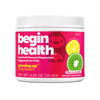Foods that Impact Magnesium Absorption in Kids
share this article

Magnesium is a vital mineral that plays a crucial role in various bodily functions, including muscle and nerve function, energy production, and bone health. Adequate magnesium intake can also potentially support constipation relief and gut health. However, certain foods and beverages can interfere with magnesium absorption, potentially impacting overall health and well-being in kids. Let's explore the top foods that can potentially impact magnesium absorption in your kids.
Daily reads to help your little ones lead happier and healthier lives.
Join the
Happy Gut Club
Processed Foods High in Sugar
Processed foods such as sugary snacks, candies, and sweetened beverages are often low in essential nutrients like magnesium and high in added sugars. Excessive sugar intake can increase urinary excretion of magnesium, leading to reduced absorption and potentially contributing to magnesium deficiency [1].
High-Sodium Foods
Foods high in sodium, such as processed meats, canned soups, and salty snacks, can also interfere with magnesium absorption. High sodium intake can increase urinary excretion of magnesium and calcium, leading to electrolyte imbalances and potential health issues [2].
Foods High in Oxalates
Certain foods contain high levels of oxalates, compounds that can bind to magnesium and inhibit its absorption in the gut. Examples of foods high in oxalates include spinach, rhubarb, beet greens, and nuts. While these foods can still be part of a balanced diet, it's essential to consume them in moderation to optimize magnesium absorption [3].
Balanced Dietary Approaches
While limiting the intake of foods that interfere with magnesium absorption is essential, it's equally important to focus on a balanced dietary approach that includes magnesium-rich foods and promotes overall health. Encouraging kiddos to consume a variety of nutrient-dense foods such as leafy greens, nuts, seeds, whole grains, and legumes can help ensure an adequate intake of magnesium [4].
Hydration and Balanced Electrolytes
In addition to dietary factors, maintaining proper hydration and balanced electrolytes is crucial for optimal magnesium absorption. Encouraging kiddos to drink plenty of water and consume electrolyte-rich foods such as bananas, oranges, and avocados can support magnesium absorption and overall hydration status [5].
Summary
Limiting the intake of processed foods high in sugar, high-sodium foods, and foods high in oxalates can help enhance magnesium absorption for kiddos. Instead, focus on promoting a balanced dietary approach that includes magnesium-rich foods and emphasizes hydration and electrolyte balance. By making these dietary adjustments, parents can support optimal magnesium absorption and promote overall health for their little ones.
















